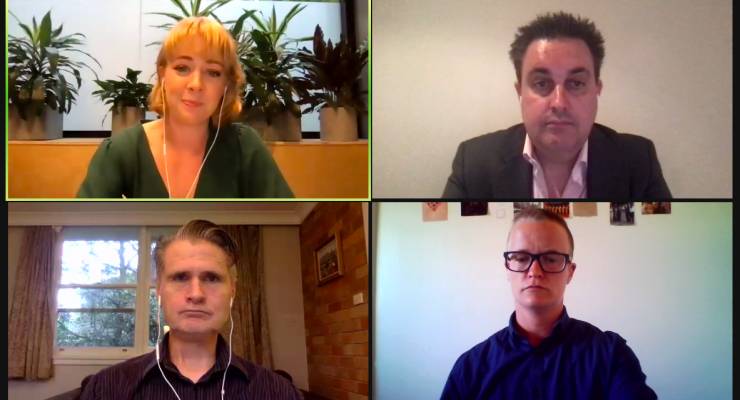
Australia has been falling in global rankings of anti-corruption, anti-bribery and anti-money laundering.
None of this will come as a surprise to anyone who’s been paying attention to the news. In recent months and years, allegations of pork barrelling, mysterious overpayments for land, and money laundering by big banks have all come to light.
But not all corruption is as obvious as it seems, as Crikey political editor Bernard Keane, UNSW Professor Richard Holden, and executive director for the Centre for Public Integrity Han Aulby told a Crikey Talks event for subscribers last night.
Corruption comes in many different forms
There are two different types of corruption, Keane said: hard or criminal corruption, which is the obvious; and soft or grey corruption, where parties try to secure a benefit against the public interest
“A lot of means around corruption are actually standard parts of the political process,” he said.
Knowing the different nuances and types of corruption is key, Aulby said. Many anti-corruption agencies like NSW’s Independent Commission Against Corruption (ICAC) have broad, fluid definitions to ensure they can keep ahead of the curve.
At the federal level, monitoring soft corruption is tough. Ministerial diaries go unpublished and Australia’s Freedom of Information Act is close to 40 years old.
“At the moment, politicians can make policy decisions and no one knows who they’ve talked to,” Aulby said.
Buying access to politicians is commonplace, Holden said, with many donors giving money to both political parties to “hedge their bets”. The top five donors give about half of all donations, meaning big companies and big donors get more access to decision-makers than smaller companies and community groups.
Is removing politicians the answer?
In NSW an independent body of experts assesses land rezoning to remove politicians and their possible agendas from the process. Aulby believes this should be brought in nationwide.
“The independent planning commission is a crucial accountability institution,” Aulby said.
But NSW’s ICAC has come under fire recently. “The problem with accountability institutions that do their job is that they ruffle the feathers of power,” Aulby said.
As Keane pointed out, politicians argue that they, unlike independent experts, represent their communities and know what’s best for them, and Holden said issues of bias can still be present in panels of independent experts.
“Regulators are very often captured by the very people or institutions they’re trying to regulate. There are a number of different reasons, one is [the] revolving door,” he said.
More than one in five registered lobbyists on the federal lobbyist register is a former political staffers. One third of all registered lobbyists are former staffers, public servants, ADF personnel or ministers and MPs.
Aulby said the lobbying code of conduct needed to be strengthened, barring politicians from becoming lobbyists for five years after they resign — though, Keane stressed, this may have a detrimental effect on political participation.
Is there an easy solution?
A federal anti-corruption commission is a good first step, Aulby said — though the one proposed by the Morrison government doesn’t go anywhere near far enough.
Keane said a lot of soft corruption goes beyond the remit of an even broad anti-corruption commission.
“Transparency is not enough,” he said. “We do need to change the incentives around a lot of these processes so there is less incentive for vested interests to try to influence decision-makers.”
Holden said he believed when it comes to transparency, “sunlight is the best disinfectant”.
“We as voters need to expect more of politicians, and the ultimate sanction is at the ballot box,” he said.








It would be great to hear an audio/podcast-style version of Talks!
This sort of article is a real help to ordinary citizens
There is a common term that incorporates a lot of what has been referred to in the above as soft crime.
That term is better described as White-collar crime.
One must bear in mind; a crime by any other name ever remains a crime.
Hence the crimes committed or engaged-in by those found guilty, are better dealt with through Australia’s civil courts rather than be left to ASIC and its rubbery Australia’s corporations law act 2001.
So much of the content in the corporations Act favors the allocation of a financial penalty as the fixative to address e.g. the ruthless intent as well as the action of blatant theft of monies from customer accounts.
The recent Hayne Royal Commission final report had provided a huge number of recommendations, unfortunately, a large proportion of the respective recommendations have simply been ignored or even batted aside as unimportant, by the currently recognized “specious” Lib/Nat coalition party government.
The Circuit court jurisdiction is far better placed to conduct what may be an appropriate examination of the charges laid against an accused then sentenced under the sentencing rules applicable, hopefully, this will represent time in prison.
Financial penalty to a large corporate entity means nothing, a spell in prison by a group of board directors conjures up a suddenly fearful group of individuals desperately pleading for whatever quantum of mercy the judge may accept. (Hopefully zero.)
Back in the old-times of the cowboy culture or era in the USA, persons such as Judge Roy Bean would just say string ’em up, or just shoot the bad guys to death.
‘Aulby said the lobbying code of conduct needed to be strengthened, barring politicians from becoming lobbyists for five years after they resign — though, Keane stressed, this may have a detrimental effect on political participation.’
I would have thought that on the contrary, this would lead to political participation by those who really care about advancing the nation, rather than by the incompetent party hacks whose only career prospect after politics is to lobby or be parked on a some board.